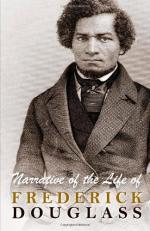|
|
The Narrative of the Life of Frederick Douglass Topic Tracking: Freedom
Chapter 2
Freedom 1: When Douglass is young, he does not understand the meaning of the slave songs with their incoherent lyrics. But in reflecting back, he admits upon hearing the songs a sense of pain, sorrow, and the first pangs of hatred for his enslaved condition. The slaves sing the songs as an expression of their deepest sorrow and longing for freedom; they are not proof, as some think, of their happiness and contentment.
Chapter 4
Freedom 2: Mr. Austin Gore, who replaces Mr. Hopkins as overseer, is considered an excellent overseer because he instills fear into the hearts of the slaves. Mr. Austin Gore does not tolerate any hint of unruliness. When a slave runs off into a lake to avoid his whip, Mr. Austin Gore cold-bloodedly shoots him dead. When asked why he did such a thing, he answers that if they allow slaves to get away with even minor acts of disobedience, then other slaves will follow-meaning eventual freedom for the slaves. The slaveholders accept Mr. Austin Gore's explanation and there is no further censure about the murder.
Chapter 5
Freedom 3: Douglass attributes his move to Baltimore as a divine providence of God. For Douglass, it is a major turning point in his life because the move serves as a first major step toward freedom. It is in Baltimore where he learns how to read and write.
Chapter 6
Freedom 4: Douglass overhears Mr. Hugh Auld chastising his wife for attempting to teach him how to read. Mr. Auld tells her that if a slave learns to read, it will make him discontent and unhappy because of his longing for freedom. Mr. Hugh Auld believes that a content slave is an ignorant slave. Douglass takes it upon himself to learn how to read at whatever cost. Learning to read is an important step to freedom. It opens up for Douglass a whole new world of knowledge, previously kept from him.
Chapter 7
Freedom 5: After his encounter with the two Irishmen at the wharf, Douglass is determined to run away to the North. To prepare, Douglass decides to learn how to write, thinking that someday, he might have to write his own pass to freedom.
Chapter 8
Freedom 6: As Douglass prepares to move from Baltimore back to Talbot county, he regrets not having made an attempt to run away. He realizes that running away will be more difficult in the country than in the city. But as he sets sail to go to St. Michael's, Douglass is once again revived with the determination to run away.
Chapter 10
Freedom 7: At the low point of his life, Douglass looks at the vessels on the Chesapeake Bay. The noble ships with their majestic sails seem to symbolize freedom. He contrasts his condition of bondage with the freedom of the ships and it provides him with a flicker of hope that helps him endure the worst.
Freedom 8: It is customary for the slaveholders to give their slaves the days between Christmas and New Year's day as a time for them to enjoy themselves to the full. The slaveholders actually encourage the slaves to have as much fun and as much alcohol as they can handle. Douglass sees this as the slaveholders' scheme to keep the slaves at bay. They want to let the slaves experience the excesses of freedom so that the notion of freedom itself will be disgusting for them.
Chapter 11
Freedom 9: Douglass finally makes his escape to freedom on September 3, 1838. He does not present the details of his escape so as to allow other slaves the same opportunities. Douglass criticizes those involved in the underground railroad in the west for publicizing the escape routes, which jeopardizes other slaves' chances of escaping.




